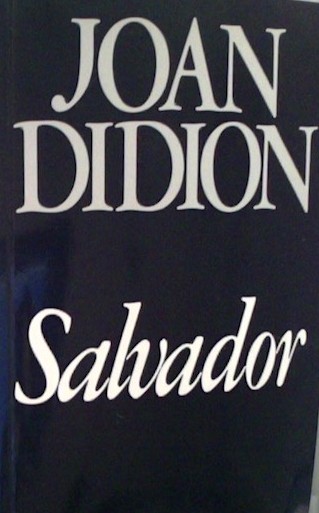Inspiring Older Readers
 posted on 20 Feb 2022
posted on 20 Feb 2022

Salvador and Miami: rereading Joan Didion’s political reportage from the 1980s
In the early- to mid-1980s Joan Didion turned her attention from the social and cultural vagaries of the US to bigger political and geo-political concerns, publishing two short books of reportage: Salvador (1983) and Miami (1986).
Salvador is a slender book but dense and dark and awful. It documents a two-week trip that Didion and her husband made to El Salvador in 1982 and sees her turning her oblique, ironic sometimes affectless gaze on the human tragedy that was El Salvador – indeed, much of Central America – during the time that the Reagan administration supported death squads, torture, mass killings and ‘disappearances’ as a bulwark against not just communism but virtually any social or economic reform. “There is a special kind of practical information that the visitor to El Salvador acquires immediately, the way visitors to other places acquire information about the currency rates, the hours for the museums,” Didion says. She means that very quickly one learns where the death squads dump their tortured, mutilated and butchered victims – trade unionists, activists, anyone identified with the left, anyone related to someone who has already been killed (an almost certain death sentence, Didion says).
Miami offers a snapshot of the sprawling city at a time when it was undergoing intense social change, driven in part by the enormous number of Cuban exiles that had settled there following what became known as the Mariel boat-lift of 1980. In a scarcely more than six-month period some 125,000 Cuban refugees took advantage of a temporary relaxation in emigration laws by the Castro regime and fled to make new lives in Miami and South Eastern Florida. They made the crossing to the US in fleets of small fishing vessels leased in Miami by supportive exile groups, anti-Castro activists and Cuban aid organisations.
The picture that Didion draws is of a Cold War Miami riven by febrile anti-Castro/anti-Communist exile politics in which the CIA was and had been deeply involved for more than two decades. And this included the most hardline anti-Castro groups carrying out assassinations and bombings that targeted other groups, businesses or individuals they considered ‘soft on communism’.
When these titles were published in the first half of the 1980s there was an urgency about their subject matter. The Cold War was at its height and the US was deeply mired in ‘dirty wars’ in Central America and was supporting brutally repressive, anti-communist regimes around the globe.
Sadly, rereading them now was hard going. Miami has aged better and is the more interesting book, but both share the same faults. The very particular tone Didion seems to reserve for ‘real politics’ – knowing, abstract, high in diction but somehow oblique and impenetrable – doesn’t offer the clarity or narrative coherence that political reportage demands and in these two books more than in anything else she wrote her prose frequently descends into annoying mannerism.
The kind of glittering miniatures of cultural criticism and exploration – the essays collected in Slouching Towards Bethlehem and The White Album – are what made Didion’s name and to my mind they remain her greatest achievement and offer the greatest reading pleasure. In contrast, Salvador and Miami are rarely discussed titles in Didion’s work; revisiting them almost forty years reveals why.
Alun Severn
February 2022
Joan Didion elsewhere on Letterpress:
Rereading Joan Didion’s The White Album